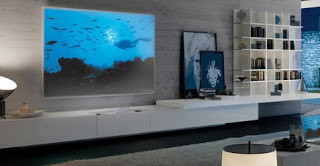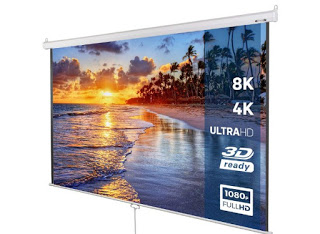 To enjoy a movie as if we were at the cinema, normally we should focus on televisions with a very high diagonal (from 60 inches up) in order to effectively recreate the effect.
To enjoy a movie as if we were at the cinema, normally we should focus on televisions with a very high diagonal (from 60 inches up) in order to effectively recreate the effect.Unfortunately, these TVs have very high prices for most people.
But there is an alternative: we can use a video projector to watch movies on one wall of the house sufficiently large and a screen for the projection, so as to faithfully recreate the cinema effect.
In this guide, we will show you all the prerequisites for using a video projector at home, the features that a good video projector must have and finally one guide to buying models with the best value for money.
At the end of the reading, we will be able to independently choose our video projector and enjoy movies at home like never before!READ ALSO -> Connect PC or laptop to the TV to watch videos and movies
For convenience, we have divided the guide into three chapters, so as to be able to analyze well all the aspects to consider before proceeding to purchase a video projector.
1) Environment analysis
Even before buying a video projector we will have to decide where to project the images.
We choose a wall of the house sufficiently high and wide, so as to be able to project the image directly onto it without even using a tarpaulin (obviously the wall must be white and not have any paintings or objects suspended).
If the part is a different color from white or there are paintings or other suspended objects, in this case, it is advisable to install a retractable tarpaulin, such as the one available here -> HD 4K 3D projector screen (€ 69).
This tarpaulin is pulled down with the classic cord and stays in place until we pull it back, returning to the inside of the housing in a completely automatic manner.
Alternatively, we can use a motorized screen, which we can close and reopen with a simple remote control; a model that we can analyze in this sense is available here -> homcom Motorized Projection Screen (€ 94).
Whatever the solution adopted, let us remember to check that the chosen environment respects the following characteristics:
– The environment where we will use the projector must be a dark room or one that can easily be darkened (curtains, shutters, etc.).
– The sofa or armchair must be positioned at the right distance, multiplying the image width by the resolution coefficient (ie image width in centimeters for 1.8 with HD Ready images (720p), 1.5 for FullHD images and 1 for images in 4K).
– The best results are obtained with the projectors fixed to the ceiling, suspended in the special support bracket.
– If the projector is to be placed at eye level, on-ground support or on a lowered cabinet, make sure to position the sofa or armchair at least 3-4 meters from the projector (possibly behind it), so as not to warn the sounds and the heat emitted by the appliance is too intense.
– We will have to place the video projector next to a home theater system at the height so that you can enjoy high-quality sound.
Together with the projector, we buy a 5.1 or 7.1 system at the height (with DTS and Dolby Digital support).
With these simple rules, we can find the ideal environment where to place the video projector in practically any home.
2) Projector features
What features should a home video projector have?
Not all projectors are the same, so before buying, let’s make sure that at least these features are present:
– Resolution: the minimum resolution for a good home video projector is FullHD (1920 x 1080 pixels), more than enough to reproduce anything with good quality.
If we are fans of the latest technologies we can also focus on FullHD video projectors with Upscaling 4K, that is able to adapt UHD images to FullHD projection (the images are clearly better than simple FullHD), or point directly on 4K projectors, in able to reproduce also UHD contents (we recommend in this case projections over 120 inches).
– Contrast: since we will reproduce the images in a dark room, a contrast of 5,000 to 1 may suffice.
If the room is lightly lit or we want to watch movies even during the day, we will inevitably have to increase the native contrast to 10,000 to 1.
Let’s not rely on dynamic contrast: it is artificially obtained with image processing, so it is better to look directly at the native contrast.
– Brightness: for dark environments, a brightness of 2000 lumens is enough, for more illuminated environments we recommend never going below 4000 lumens.
– Type of projection: currently there are three methods for image projection, ie DLP, LCD is OVER THERE (also called LCoS and SXRD).
The cheapest but bright is the DLP, while a good compromise between quality and lighting is obtained with LCD technology.
D-ILA technology combines the advantages of both previous technologies, but the costs are high and maintenance must be carried out regularly.
Also base your choices on these factors, so as to avoid finding yourself with a useless or poor quality projector after a few years.
– Connectivity: to be able to connect the playback source (Blu-ray player, DVD player and satellite decoder), make sure that the projector chosen has an HDMI, DVI, and (increasingly rarely) VGA socket.
With these types of connections, we should be able to connect any modern device and reproduce our multimedia content without difficulty.
– Optical zoom: to be able to focus in any condition better on models that offer at least 2x optical zoom.
– Expandability: some video projectors behave like real TV boxes, with the ability to install apps on them (often using the Android operating system) and view streaming content without having to connect a separate PC or device.
These TV Boxes also offer a Wi-Fi or Ethernet connection to expand its functionality and thus enable on-demand content to be played directly from the Internet.
If the projector chosen does not have smart functionality or Android operating system, we can expand its capabilities by connecting to the HDMI socket a Chromecasts, so you can view any multimedia content from compatible apps for Android and iOS.
3) Buying Guide
After this series of tips, let’s see together the best video projector models selected from those available online.
We advise you to rely on Amazon for the great assistance provided and the quick and easy returns in case of problems.
– Acer H6540BD Projector (€ 490): excellent video projector with FHD + resolution, 10,000: 1 contrast, 3,500 lumens brightness, VGA / MHL port, HDMI port, included a speaker and Nvidia 3DTV.
– Epson EB-U05 3LCD video projector (€ 493): a mid-range projector with a contrast ratio of 15,000: 1, 3.400 lumens brightness, 2 HDMI ports, and a VGA port.
– BenQ W1090 (€ 654): medium-high-end projector with 1080p Full-HD resolution, RGBRGB color wheel with 6-speed W, Audio CinemaMaster with 10 W speakers, 2000 lumens brightness and Sports mode (for fast images ).
– XGIMI H2 Projector (€ 999): high-end projector with Full HD resolution, 3D function, Harman Kardon Stereo, Auto Focus, Dual-Band Wi-Fi 2.4G / 5G, Bluetooth, MEMC, Android operating system, and two ports HDMI.
– Epson EH-TW6700 (€ 999): another high-end projector with a contrast ratio of 70,000: 1, 3000 lumens brightness, Frame Interpolation function, and Detail Enhancement technology, 3D depth adjustment and built-in speaker.
READ ALSO -> Best Smart TVs to buy

